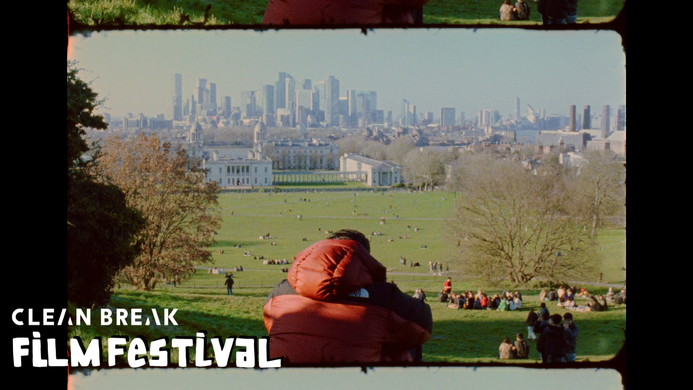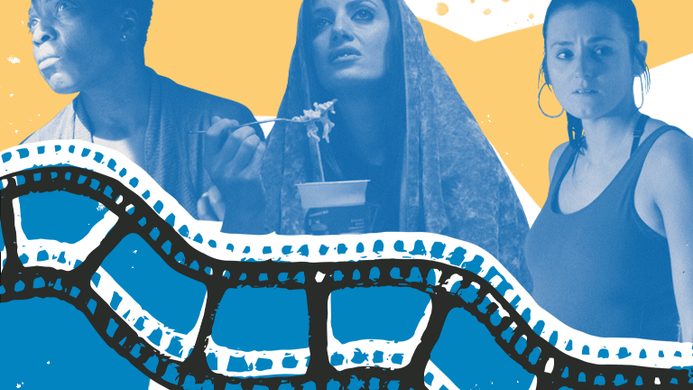
Expert insights into the themes in our Film Festival Programme
Three Barristers have shared their thoughts on a selection of the films we're presenting as part of our online Film Festival.
Gillian Jones KC, Co-Head of Chambers and Development Board Member at Clean Break: "Chambers are committed to supporting charitable initiatives like Clean Break, which play an invaluable role in helping women with lived experiences of the criminal justice system to rebuild their lives through the arts. These short films highlight the resilience of individuals and communities and explore crucial issues that are often overlooked shining a light on the transformative power of storytelling through film."
Thank you to Zoë Chapman, Valerie Charbit and Francesca Kirby for watching the films and sharing your unique perspectives. Read their reviews:
By Valerie Charbit, Barrister at Red Lion Chambers
Adra Ni Y Mor ( Out Home The Sea) presents a thought-provoking narrative of a woman living with her daughter by the sea.
The film makes you wonder about the prevalence of second homes in Wales and the detrimental effect of them on local communities. It depicts a single mother looking after her daughter living in a caravan by the sea, unable to afford safer housing and potentially on the verge of being moved to a school which is not Welsh speaking (which is not where she wants to live). The film, in its minimalism, starkly illustrates the social and environmental consequences of living in a caravan on a cliff edge, inviting viewers to consider the long-term effects of climate change on communities.
Yet, the film also shows how second homes provide important work for those living in such communities. Is getting rid of second homes the solution to the housing problems for those who are more vulnerable when they may rely on earning an income from them or because of them? Ultimately, the audience is drawn to the situation wanting to know more about this single mother’s life and I wanted to reach out and reassure her that she was doing a great job.
The focus is on a single mother and daughter, but the woman’s mother is revealed as being estranged, living with someone the woman believes is dangerous. This illustrates the vulnerability of the single parent who has no familial support.
The vulnerability of the single mother and her daughter prompts the audience to reflect: How many families have already left these communities? What remains in their absence? The film concludes without providing a clear resolution, encouraging the audience to think more deeply, which is something I really appreciated about it.
By Francesca Kirby, Criminal Barrister at Red Lion Chambers
Home perfectly encapsulates the difficulty many face of returning back to society when released from prison. Kay having been released evidently struggles with the fact the wider world, whilst still familiar, feels like it has changed. In the film, through the well shot cinematography, we see Kay cautiously navigate the home that she once knew before release, which now feels unfamiliar. Whilst she tries to enjoy her newfound freedom, you can see the effect of being in custody gnawing away at her.
Her relationship with her friend Jenna was sensitively portrayed by both actors, and it was evident that although they shared a close bond it has been stretched and pulled by the fact she has been in custody. Jenna’s questions about Kay’s time in custody, relying on common stereotypes, demonstrate just how little people who haven’t been to prison understand what it is like.
I very much enjoyed Kay’s answer to what she enjoys most about being released, namely the fact she can see the corners of her bedroom and that it is never fully dark. This juxtaposed with the next scene where Jenna finds Kay struggling to sleep demonstrates that even though she can now control the amount of light, the darkness of prison has stayed with her.
As a practitioner, Home made me think of all of the ways we don’t equip those who have been in custody for their release. In this example, Kay’s relationship with her friend Jenna is a huge support for her, but even Jenna couldn’t fully understand what Kay had been through. I was left thinking about all of those released from custody who don’t have friends, family or any support network, how do they navigate the next steps? The film highlighted the importance of showing compassion to those who have been released as this plays a crucial role in helping prison leavers reintegrate back in society and find their way back home.
By Zoë Chapman, Criminal Barrister at Red Lion Chambers
Watching this film, I found myself wishing it was a sort of dystopian fantasy set in a future we might yet avoid if we tweaked a few prison policies and maybe employed a few more social workers. Unfortunately, it is a stark illustration of the experiences of women at the hands of today’s criminal justice system.
Sweatbox forces the watcher to confront the fact that people who are criminalised are as human as everyone else, trapped in a system that often treats them with contempt and offers little in the way of ‘rehabilitation’. Does our indifference, or ignorance, operate as tacit approval of this state of affairs? If so, Sweatbox is essential viewing for all. Through the women locked inside the van, we hear about a friend’s pig gut-throwing dad and a zealously religious aunt, representatives of a section of the public which seems prepared to nurse a binary view of those who break the law: pure evil, pure scum, pure Other. Being trapped inside the prison van with Nina, Steph and Rachel, albeit only for 12 minutes, is a lesson in recognising that people who offend are just that – people - with the same capacity to suffer as anyone with a clean PNC.
But this film is about women who are criminalised in particular. As the film highlights, a tiny proportion of the prison population are women. Most of them are guilty of non-violent offences and are serving short sentences – short sentences with long-reaching consequences, for housing, employment and children. Some of those in prison - including one of the protagonists, Steph – are pregnant. That prison is never a safe place to be pregnant has been made tragically clear in recent times with the deaths of two babies born in custody. Thankfully, steps are being taken towards ensuring that pregnancy (current or recent) as a mitigating factor is being properly considered when it comes to sentencing. However, Sweatbox is a visceral reminder of why the pressure should be kept on law and policymakers to take steps to ensure that women, especially pregnant women, should avoid custodial sentences wherever possible.
By Valerie Charbit, Barrister at Red Lion Chambers
This film is immediately engaging by presenting the unique and often unheard perspective of the motivations of those who commit crime: camaraderie, wealth, excitement to name but a few. It effectively portrays how three men have endured harsh upbringings and experiences, shaped by the environments they were born into. In turn, each use crime as an escape route. There is an understanding that by committing crime they are able to find freedom from the prison they feel they have grown up in i.e. the fenced-up council flats that outsiders rarely entered.
As well as providing a unique perspective into why these men began a life of crime the film also focussed on the difficulties of life after prison, something I have long felt is misunderstood and rarely thought about by politicians. The film challenged conventional notions of prison and rehabilitation, raising a crucial question "Who is the public being protected from when a prisoner is released, if they haven’t been reformed?" The film invites the audience to reconsider the effectiveness of the current prison system. It also explores issues of PTSD and anxiety and a range of other mental health issues that vulnerable men who are released from prison suffer from. So, the negative cycle continues. Through these perspectives, the film emphasises the need for both social and structural reforms to address the root causes of crime and mental health struggles.
I felt it was a film with the power to change the perspectives of those who believe in the effectiveness of prison - perhaps the sequel could focus on exploring what alternatives to prison actually work, exploring what takes place in other countries.
As one of the leading criminal sets at the Bar, Red Lion Chambers is dedicated to supporting charities such as Clean Break that help women with experience in the criminal justice system rebuild their lives, through the power of theatre and the creative arts: redlionchambers.co.uk
Please register or log in to the Hub to view additional content below.

